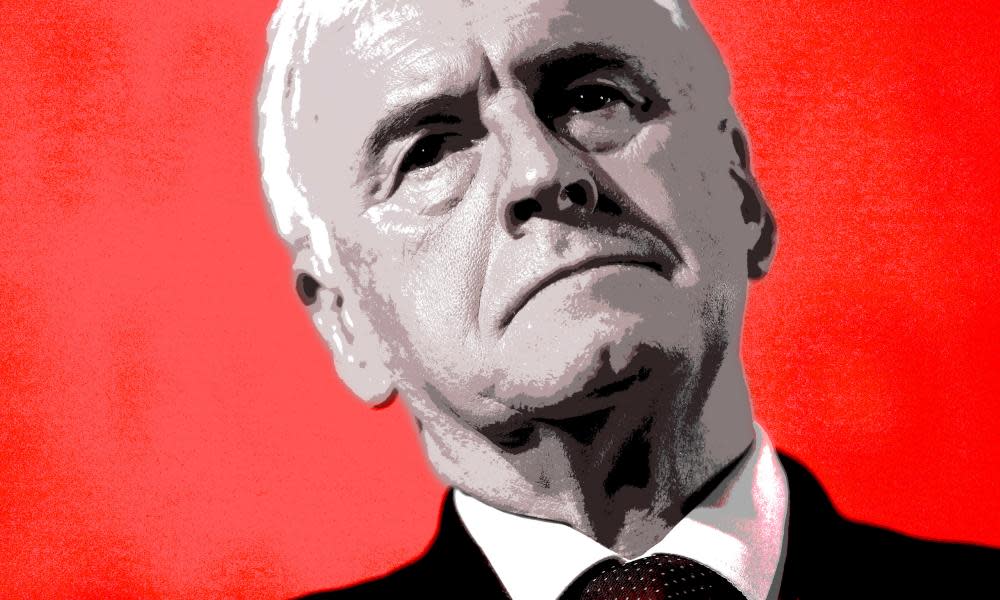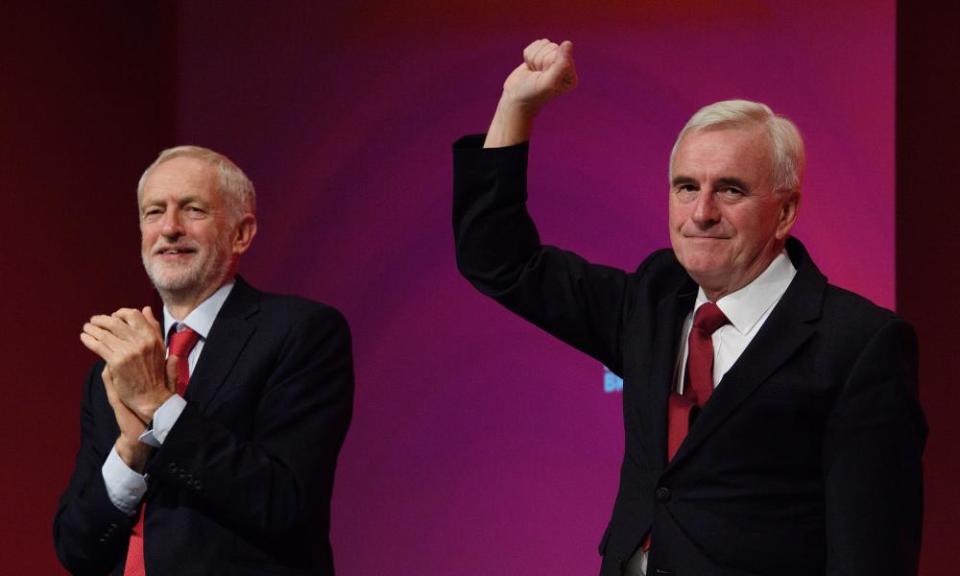Astute and laser-focused, John McDonnell can win a radical mandate for Labour

He bestrides this conference like a colossus. Big Mac is the one they want to hear, from Andrew Marr to Mumsnet. Lobbyists for every cause are eager to catch his coat-tails. John McDonnell is the man who matters because what he says goes when it comes to almost everything at this Labour gathering in Liverpool. His imprimatur is stamped on every card vote and each frontbench speech; it is as disciplined as in the old New Labour pager-control days.
His easy confidence grows with his party’s success. The shadow chancellor is intellectually assured among top economists, politically astute – and laser-focused on victory. You might say shining is not too difficult when few frontbenchers are well known and fewer radiate star quality. But he has it.
Now Labour’s success hangs on his ability to persuade voters that his party’s plans to radically reform capitalism will work. How well can he defend them against a tsunami of red-scare stories in a general election? That election may come soon, propelling him into No 11 in the midst of Brexit turmoil – only fools pretend to know what happens next. He is on the wrong side of party members over a people’s vote, and there’s no knowing if the Brexit motion that he helped to fudge can hold for long.
Labour is halfway to persuading the country. Revulsion at austerity has swung the pendulum of public opinion its way: only 4% want more cuts according to recent polling. Long Tory years always bring abhorrence at homeless people living on the streets and decaying public services. But these post-crash years have brought a more profound aversion to the dysfunctional distribution of capital, wealth and power. Any audience, even Tory voters, will cheer a speaker these days for reciting familiar but still shocking facts: the FTSE 100 chief executives on 145 times their average employees’ pay; the sucking up of money from wages to shareholders; the higher rewards for unearned income than for hard-earned pay; and quantitative easing swelling the assets of the already rich while wages remain lower than a decade ago. The spectacle at company AGMs of shareholders failing to rein in out-of-control boards disgusts most people, as does tax avoidance, with hated water, rail and energy companies popular targets for nationalisation.
Labour goes with the popular grain when it calls out these systemic distortions. McDonnell’s task, almost single-handedly, is to convince that his plans can realistically shift wealth, income and power towards productive investment and those who produce it. Critiques are easy but solutions fiendishly difficult.
McDonnell’s policies are novel and unfamiliar to voters. With mercifully little rhetorical flourish at Liverpool, he gave a wide-ranging radical overview of his plans, from John Lewis-style share ownership for employees to a third of seats on boards for staff. A national investment bank, collective bargaining, fairer pay ratios and taking private finance initiatives (PFIs) back into public ownership would shift the balance of power and money. He celebrates good capitalists, but threatens the bad. McDonnell didn’t use his old joke today on tax avoidance, but he often says he has found a magic money tree – “It’s in the Cayman Islands. We’re going to dig it up and bring it here.”

Will the public believe Labour is indeed “planned, ready and prepared … to implement our programme when we win”? On every outing he sounds more convincing on details.
Unsurprisingly, utility shares dropped today, the Institute of Directors raged and a chill wind blew through a Treasury threatened with Stalinist “reprogramming”. But increasingly, wise observers predict McDonnell is winning over the public, partly because his ideas are the only ones in town – the Tories ran out of them long ago. The tide has turned against the Thatcherite worldview, not just against cuts but against the gamut of privatisations, deregulations and PFIs. Tories warn that McDonnell will bust Britain with national debt, yet say nothing of Donald Trump’s tax cuts for the rich that have doubled the federal deficit, with no run on the dollar.
The archbishop of Canterbury, Justin Welby, has done McDonnell a mighty favour in leading the Institute for Public Policy Research’s Commission on Economic Justice, which produced a near-blueprint for this reshaping of wealth and power. The other commissioners, including a former McKinsey partner, a senior member of the City of London Corporation and Dame Helena Morrissey of Legal & General Investment Management, give Labour welcome heft for radical change.
When McDonnell says Thatcher’s deregulation of finance turned the City into “a multi-million pound casino”, they have his back. When the Financial Times warns business and government to catch up with these new ideas, you know the weather vane is turning. When the former Goldman Sachs economist and former Tory Treasury minister Jim O’Neill says Labour has caught the mood of the times, the new thinking is becoming respectable.
The McDonnell of today is not easily dismissed as the maverick Marxist of yesteryear. Unlike Jeremy Corbyn’s retro rigidity, McDonnell has modern thoughts. When the Confederation of British Industry, predictably, warns that Labour would “crack the foundations of the nation’s prosperity”, people will snort with derision. Whose prosperity?
Political commentators’ lore presumes that a shadow chancellor outshining his leader must be in want of the top job. But when he says “No, no, no” he probably means it. He has learned the lesson of Blair-Brown fratricide. Gordon Brown’s tragedy is that he could have chosen to be the great chancellor, but is remembered as a hapless prime minster. McDonnell might make a good leader, but sees strength in leading from behind. Let Corbyn be the cross-legged guru on the altar, while McDonnell acts as high priest interpreting the master’s vaguer mind.
Old timers in the party regard McDonnell as a dark force beneath the surface charm, a touch satanic, flick-knife in pocket with hidden agendas and devious ways. That may be so. But those may be Thomas Cromwell-type talents required in a wicked world to bring his party to power and his ideas to fruition. But to prevail as much as Henry VIII’s right-hand man did, McDonnell must prevent a bloodbath of MPs from his party’s other wing, threatened by some here in Liverpool: mass defenestrations would cast a disunited Labour in the public eye as narrow, bigoted and nasty. All the signs are that he is deadly serious about power, as he sets out to repair the worst dysfunctions of modern klepto-capitalism.
• Polly Toynbee is a Guardian columnist

 Yahoo News
Yahoo News 
